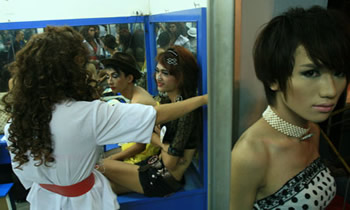Coming out party on Valentine's Day will increase Vietnamese society's tolerance, homosexuals hope

Nguyen Van Trung, 35, is as excited as a teenager going to his or her first party.
But the excitement is tinged with some nervous bravado, because Trungs coming out party seeks to increase public tolerance toward the gay community in Vietnam.
A group of 100 gay activists is planning to raise awareness and visibility by wearing pink T-shirts proclaiming, "I am gay." They will walk together on the sidewalks in downtown Ho Chi Minh City, probably on the upcoming Valentines Day, Trung said.
This will be the first time such an activity has been organized by the gay community in Vietnam, said Trung, member of a HCMC voluntary group that seeks to advise men who have sex with men (MSM) on safe sex and HIV-related knowledge.
I only hope that by doing so, the public will be more tolerant of people like us since we do no harm to the society.
Trung said the fact that society has become more open to gay people has inspired him and his peers to come out. They had originally planned to take to the streets last Tuesday to mark World AIDS Day (December 1), but canceled it at the last minute as the shirts were not printed on schedule.
Very few gay people publicly come out in Vietnam. Homosexuality is still a taboo subject in the traditionally patriarchal society long ruled by Confucian social mores and Buddhist beliefs.
Most gay people are very afraid to say that they are gay. [But] most of them find out when they eventually do reveal it, it is more easily accepted than they thought it would be, said Donn Colby, medical director of the Harvard Medical Schools AIDS Initiative in Vietnam.
Thats a very positive sign, said Khuat Thu Hong, co-director of the Hanoi-based Institute for Social Development Studies, a local non-governmental organization. I hope this momentum continues so gay people in Vietnam enjoy the same rights as everyone else.
Vietnams HIV epidemic is concentrated among people who inject drugs, sex workers and men who have sex with men. Across Vietnam, an estimated 243,000 people were living with the virus at the end of 2009.
But Colby acknowledged that there was still discrimination against MSM in Vietnam, particularly in rural areas, and most MSM still hide the fact, leaving them very vulnerable to contracting the HIV virus.
If you look at how much money had been spent by the Vietnamese government and international donors on HIV prevention, the amount that goes to MSM is much less than that given to other high-risk groups. When it comes to HIV prevention, MSM get fewer resources.
They should increase the amount of research that is given to prevention for MSM, Colby said.
Trung said gay men in rural Vietnam still suffer social stigma and discrimination.
They are sneered at or have to bear worse insults wherever they go. We are also human. We also have our own dreams.
Our happiness is in being able to live our real lives. I hope that in the near future, gay people like me will have a space where we can relax without worrying about being arrested or chased away.
Double Stigma
A study released last year by Hanois STDs/HIV/AIDS Prevention Center confirmed the stigma against gays and listed the consequences for men who have sex with men (MSM) in Vietnam.
The study, sponsored by the Ford Foundation, was conducted in six cities/provinces including Hanoi and Thai Nguyen in the north, Da Nang and Nha Trang in the central region, and Ho Chi Minh City and Can Tho in the south. The study team conducted structured interviews, using questionnaires with 813 MSM, 900 community members and family members of MSM, 600 key officials/staff from departments/organizations, 45 focus group discussions, and 196 in-depth interviews with the above-mentioned respondents.
Generally, local people and officials considered MSM unnatural (68 percent) and almost half saw it as an illness (48 percent). Around 36 percent of respondents said that MSM was a social evil that should be eliminated, while 27 percent considered it a result of debauchery.
Stigma towards people living with HIV is similar to that faced by men who have sex with men and transgender people because it is often based on moral judgments, said Khuat Thu Hong, co-director of the Hanoi-based Institute for Social Development Studies, a local nongovernmental organization. Men who have sex with men and transgenders living with HIV face double stigma.
(Reported by An Dien in Look at Vietnam, December 2010)

